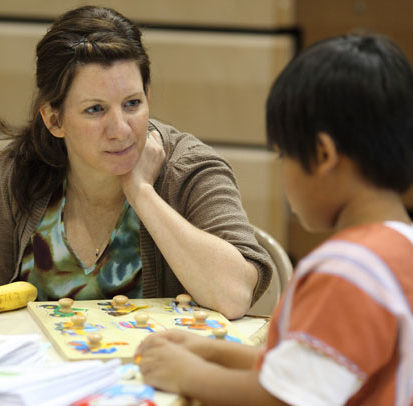
Rebecca Haworth, a College of Public Health graduate, works with a child at a "developmental milestones" booth at the 2013 Bridge to Care Health Fair.
Education Highlight – Shifts in healthcare delivery, toward a patient-centered, collaborative model, depend upon a high-functioning, multidisciplinary health team. In response to these trends, academic institutions have been developing approaches to Interprofessional Education (IPE), so that students are prepared to work effectively in a team environment. In fact, all academic accrediting bodies for major health professions’ education, including public health, now mandate IPE training.
UNMC has been at the forefront of IPE, holding biannual IPE days for all students across campus since 2008, and helped launch the UNMC-sponsored Journal of Interprofessional Education and Practice (http://www.jieponline.com/), published by Elsevier. Despite the growing importance of IPE, what it ‘looks’ like for public health students is sometimes difficult to envision, compared to their counterparts in clinical degree programs. Here at UNMC, COPH students have been fortunate to be a part of IPE from the beginning, with students and faculty taking on a leadership role for various campus activities.
Denise Britigan, Assistant Professor at COPH notes the importance of IPE for COPH students, “Not only does IPE expose our students to other disciplines and professionals besides their own, it reinforces the need to learn to communicate differently with others as well. We simply can’t afford to graduate our students from our various programs without that important transferrable skill.” Devin Nickol, UNMC’s Assistant Dean for Interprofessional Education, agrees. “Issues like patient safety, health care quality, health equity, and preventive medicine are among the most important challenges facing health care teams today. All of these are public health issues, and the expertise of public health practitioners will be essential if we are to address them successfully.
All UNMC students participate in two IPE days, where they walk through case studies from the perspective of various disciplines, and learn elements of effective teams. In addition to these required activities, many COPH students are active in a number of efforts which put interdisciplinary work into practice in the community. Dr. Britigan explains, “In addition to my responsibilities in the College of Public Health, I also serve as the part-time Director of the Office of Community Engagement (OCE) under Academic Affairs at UNMC. I have seen the importance of both service learning and IPE experiences for our students campus wide. The OCE currently administers four Legacy Projects which are perfect examples of this:
Bridge to Care — works with resettled refugees in Douglas County/Omaha metro area to link them with health care providers and preventive health services;
Decreasing the Donor Deficit — aims to raise awareness of cancer treatment by bone marrow transplantation and to recruit new donors;
do juSTIce — allows students to interact with inmates to deliver STD education, testing, and treatment, as well as allows them to develop strategies for intervention;
EMPOWER — provides education and basic health screenings to empower women who are victims of domestic violence through knowledge of their personal health.”
COPH students have played a lead role in each of these organizations from the beginning, drawing upon public health strengths such as collaboration, assessing the needs of a community, developing appropriate interventions, and evaluation; all things they will find themselves doing upon graduation as a part of the workforce.
To find out more about UNMC’s approach to IPE, visit www.unmc.edu/ipe. For those at UNMC, or in the area, the next IPE day will take place in February 2017. If you have an interest in volunteering, please contact Giovanni Jones, M.Ed 402-559-3662 or giovanni.jones@unmc.edu.

